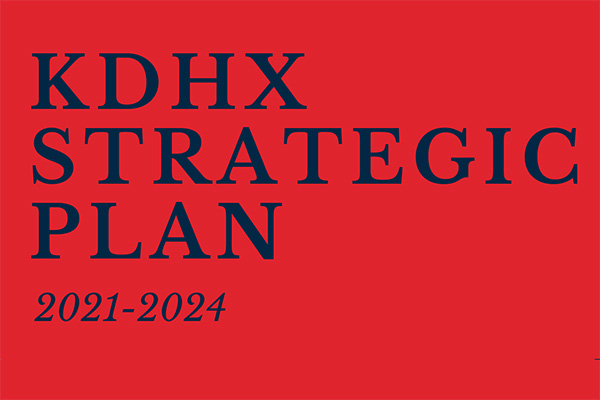
A Look at KDHX’s Priorities: Our Plans to Address Racism in St. Louis and Within KDHX
The past decade at KDHX can be characterized by tremendous transition, growth, and obstacles. I recently shared that we have undergone a strategic planning process to guide us through a journey of (un)learning and leading. At the center of the process was the question, “How must KDHX boldly adapt and grow in order to advance its important mission-- to build community through media?”
Based on engagement with staff, donors, funders, volunteers and other KDHX community members, we committed to three key priority areas. To enact change within these priority areas, the Board of Directors and staff have identified and agreed to action steps.
You can read about the first of these priority areas here.
The second of those three priority areas is to build anti-racist capacity. We recognize that a system of policies, practices, and procedures designed to benefit white people coupled with pervasive and consistent personal biases continue to harm non-white members of our community, and that we must address our role in the perpetuation of systemic racism.
Here is our plan for this priority area over the next three years:
Build Anti-Racist Capacity
The goal:
As part of an explicit commitment to anti-racism, by 2024, KDHX will identify systemic barriers to racial equity in its industry, in St. Louis, and within KDHX; will institute policy changes and cultural shifts to overcome those barriers; and will serve as a catalyst for accelerating action toward a racially equitable St. Louis.
To authentically live into its mission to build community through media, KDHX aspires to be an anti-racist institution. As such, the station Board, staff, and volunteers must complete extensive training so that there is a shared understanding of anti-racism within an organizational context. Further, dismantling cultural biases must be a priority. To do so, KDHX needs to invest in a racial equity capacity assessment to identify the organization’s “starting point” and prioritize activities beyond those identified as part of the organizational strategic plan. Additionally, KDHX must undergo a top-to-bottom policy review. By building anti-racist capacity, KDHX will create a sense of belonging for a more diverse set of Board members, staff, volunteers, and listeners.
Achievement of this goal will be attained using the following action steps:
1: Enroll staff and Board in CrossRoads Anti-Bias, Anti-Racism (ABAR) training
-Attendees indicate increased understanding of anti-racism and the racist history of St. Louis
-Build shared baseline and lexicon for discussing matters of race and racial equity
2: Create an organization-wide anti-racism charter (statement) and goals
-Completion of statement to explicitly name organization’s commitment to anti-racism and specific goals and tactics to live out this commitment; begin implementation of goals
3: Develop a clear action plan for addressing systemic racism and investing in systemic change
- Identified an assessment partner
- Conducted stakeholder sessions and policy reviews to capture the organizational “starting point”
- Prioritized areas of growth
- Developed a racial equity capacity plan
4: Develop a plan for enhancing Board, staff, and volunteer diversity.
-Increased staff and volunteer diversity such that the composition of KDHX stakeholders is representative of the broad St. Louis community
5: Update hiring protocols/processes to ensure diverse candidate pools and questions to assess cultural competency and biases of incoming staff members and volunteers
-Increased staff and volunteer diversity such that the composition of KDHX stakeholders is representative of the broad St. Louis community
6: Complete top-to-bottom review of all Board and organization policies and procedures to check for cultural biases and make recommendations to address and change
-Increased retention of diverse Board, staff, and volunteers
-Staff and volunteers report increased satisfaction and sense of belonging related to organization’s overall diversity and inclusion
7: Develop and implement annual DEI training for all active KDHX volunteers
-Build shared baseline and lexicon for discussing matters of race and racial equity
-Increased understanding of organizational expectations in regard to bias and cultural awareness
The Board and staff of KDHX - each one of us - is fully committed to each of the objectives and priorities of the strategic plan and also to being held accountable for them. As we transform ourselves and transform our organization, we ask that you engage with us so that we can continue to shed blinders and stand in the light of humility, transparency, and audacity.
To learn more about our strategic plan, click here.
Kelly Wells
Executive Director


